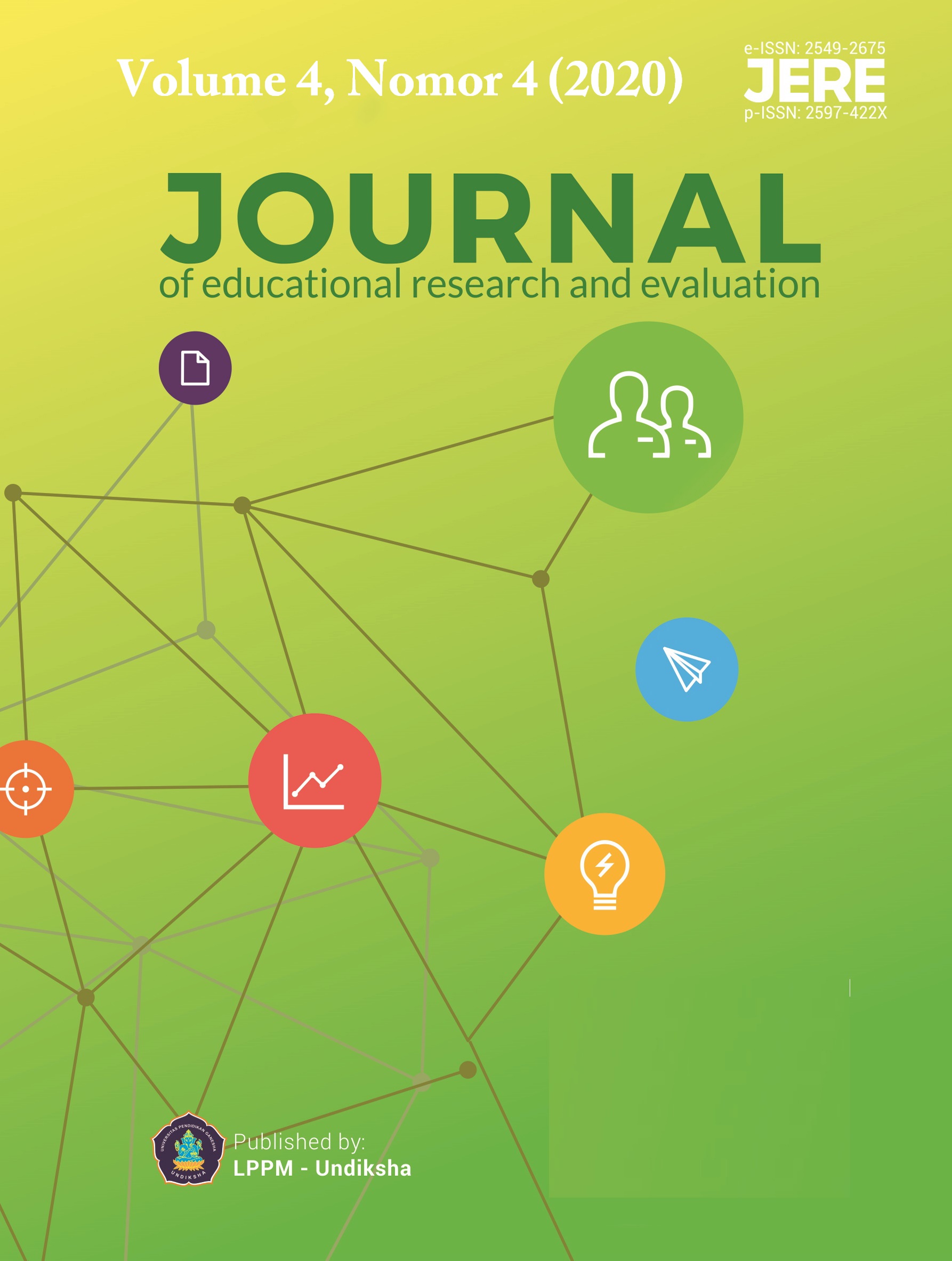The Effectiveness of the Learning Model Oriented Towards the Dimensions of Knowledge and Cognitive Processes
DOI:
https://doi.org/10.23887/jere.v4i4.30041Keywords:
cognitive domains, orientation of knowledge, cognitive processesAbstract
The teachers in elementary schools have not conducted studies and developments as well as changes in the learning process oriented towards the latest student cognitive domains. The proof is that the teacher is only able to make items on the evaluation of learning outcomes that only ask students to utter memorization. This study aims to develop a learning model oriented to the dimensions of knowledge and cognitive processes. This type of research is a development with the Dick & Carey model. The subject of this research is a learning model oriented to the dimensions of knowledge and cognitive processes. Data collection methods used were interviews, documentation, questionnaires, and tests. The data analysis used is the t-test. The results showed that the learning model with the orientation of knowledge and cognitive processes (PSBDPPK) was valid, effective, and efficient to be applied in elementary schools, and the results of the t-test show that this model has a significant effect on student learning outcomes, this is indicated by the t-test, the value (Sig. (2-tailed)) is 0,000. So, it can be concluded that the learning model that crosses the dimensions of knowledge and cognitive processes (PSBDPPK) is valid, effective, and efficient to be applied in elementary schools.
References
Adriani, D. (2018). Pengaruh Percaya Diri, Kebiasaan Belajar dan Motivasi Belajar Terhadap Hasil Belajar Siswa Pada Mata Pelajaran Ekonomi. Jurnal Pendidikan Ekonomi, Manajemen dan Keuangan, 2(1), 19–28. https://doi.org/http://dx.doi.org/10.26740/jpeka.v2n1.p19-28
Aini, N. (2015). Studi Komparasi Kurikulum Bahasa Arab Tingkat Satuan Pendidikan dan Kurikulum 2013 Satuan Pendidikan dan Kurikulum 2013. Al Mahāra: Jurnal Pendidikan Bahasa Arab, 1(1), 131–156. https://doi.org/10.14421/almahara.2015.011-06
Anderson, L. W., & Krathwohl, D. R. (Eds). (2010). Kerangka Landasan Untuk Pembelajaran, Pengajaran, dan Asesmen. Pustaka Pelajar.
Anisah, G. (2018). Validitas Instrumen Asesmen Menulis Cerpen Terintegrasi Pendidikan Karakter. Jurnal Pendidikan Islam, 3(1), 15–25. http://ejournal.sunan-giri.ac.id/index.php/al-ulya/article/download/148/114/429
Baidarus, Hamami, T., Suud, F. M., & Rahmatullah, A. S. (2019). Al-Islam dan kemuhammadiyahan sebagai basis pendidikan karakter a * Baidarus, b1 Tasman Hamami, c2 Fitriah M. Suud, d3 Azam Syukur Rahmatullah. AL-ASASIYYA: Journal Basic Of Education, 4(1), 71–91. http://journal.umpo.ac.id/index.php/al-asasiyya/index.
Bruce Joyce, Weil, M., & Emily Calhoun. (1986). Model of Teaching Jersey: Prentice Hall Inc.
Bujuri, D. A. (2018). Analisis Perkembangan Kognitif Anak Usia Dasar dan Implikasinya dalam Kegiatan Belajar Mengajar. LITERASI (Jurnal Ilmu Pendidikan), 9(1), 37. https://doi.org/10.21927/literasi.2018.9(1).37-50
Degita, P., Firman, & Efendi, J. (2019). Peningkatan Kemampuan Berpikir Kritis Siswa Melalui Model Inkuiri pada Pembelajaran Matematika di Sekolah Dasar. Jurnal Basicedu, 3(2), 524–532. https://doi.org/https://doi.org/10.31004/basicedu.v3i3.191
Dick, W., & Carey, L. (1990). The Systematic Design of Instruction. (Third ed.). Harper Collins Publishers.
Gunawan, I., & Paluti, A. R. (2017). Taksonomi Bloom-Revisi Ranah Kognitif Kerangka Landasan untuk Pembelajaran, Pengajaran dan Penilaian. E-Journal.Unipma, 7(1), 1–8. http://e-journal.unipma.ac.id/index.php/PE
Huda, A. K., Reffiane, F., & Untari, M. F. asri. (2019). Keefektifan Model Pembelajaran Tebak Kata Terhadap Hasil Belajar Ipa Siswa Kelas Iii Sd Negeri Rejosari 03 Kota Semarang. Malih Peddas (Majalah Ilmiah Pendidikan Dasar), 8(2), 171. https://doi.org/10.26877/malihpeddas.v8i2.3072
Mulyasih, P. S., & Suryani, N. (2016). Pengaruh Disiplin Belajar, Lingkungan Keluarga, Dan Motivasi Belajar Terhadap Prestasi Belajar Mata Pelajaran Pengantar Administrasi. Economic Education Analysis Journal, 5(2), 602–602. https://journal.unnes.ac.id/sju/index.php/eeaj/article/view/13664
Ningsih, S. Y., & Gustimalasari, G. (2018). Penggunaan Strategi Pembelajaran Aktif Everyone Is a Teacher Here (Eth) Terhadap Kemampuan Pemahaman Konsep Matematika Siswa Kelas Vii. MES: Journal of Mathematics Education and Science, 4(1), 95–100. https://doi.org/10.30743/mes.v4i1.876
Nurhasnawati, N. (2011). Model-Model Pembelajaran Konstruktivisme. An-Nida’, 36(2), 237–259. http://ejournal.uinsuska.ac.id/index.php/Anida/article/view/304%0Ahttp://moraref.kemenag.go.id/documents/article/97406410605842470
Putri Ningrat, S., Tegeh, I. M., & Sumantri, M. (2018). Kontribusi Gaya Belajar Dan Motivasi Belajar Terhadap Hasil Belajar Bahasa Indonesia. Jurnal Ilmiah Sekolah Dasar, 2(3), 257. https://doi.org/10.23887/jisd.v2i3.16140
Ricardo, R., & Meilani, R. I. (2017). Impak Minat dan Motivasi Belajar Terhadap Hasil Belajar Siswa. Jurnal Pendidikan Manajemen Perkantoran, 2(2), 79. https://doi.org/10.17509/jpm.v2i2.8108
Sartika, I. (2019). Kemampuan Berpikir Kritis Dalam Pendekatan Matematika Realitik di Sekolah Dasar. AR-RIAYAH : Jurnal Pendidikan Dasar, 3(2), 101. https://doi.org/10.29240/jpd.v3i2.1151
Sudikno, I. S., & Aminah, Y. S. (2014). Pengaruh Lingkungan Keluarga, Lingkungan Sekolah, Disiplin Belajar Dan Motivasi Belajar Terhadap Prestasi Belajar Ekonomi Siswa Sma Kelas Xi Ips Sma Pgri 1 Taman Pemalang. Economic Education Analysis Journal, 3(1), 46–51. https://journal.unnes.ac.id/sju/index.php/eeaj/article/view/4131
Suhito. (2018). Menumbuhkan Kemampuan Kognitif Dimensi Konseptual dalam Perkuliahan Geometri pada Jurusan Matematika FMIPA Unnes. Prisma, Prosiding Seminar Nasional Matematika, 1, 464–470. https://journal.unnes.ac.id/sju/index.php/prisma/article/view/20133
Sulistiyo, U. (2016). English Language Teaching and Efl Teacher Competence in Indonesia. Igniting a Brighter Future of EFL Teaching and Learning in Multilingual Societies, 4(2), 396–406. http://ejournal.unp.ac.id/index.php/selt/article/view/7001/5535
Sumiyati, E. (2017). Penggunaan Model Pembelajaran Interaktif Berbasis Aktivitas Untuk Meningkatkan Prestasi Belajar Siswa Kelas Vi Pada Pelajaran Pkn Sd Negeri 09 Kabawetan. Jurnal PGSD, 10(2), 66–72. https://doi.org/10.33369/pgsd.10.2.66-72
Suparlan, S. (2019). Teori Konstruktivisme dalam Pembelajaran. Islamika, 1(2), 79–88. https://doi.org/10.36088/islamika.v1i2.208
Susanto, A. (2012). Teori Belajar dan Pembelajaran di Sekolah Dasar. PT Fajar Interpratama Mandiri.
Umam, K. (2018). Peningkatan Kemampuan Berpikir Kritis Matematis Siswa Melalui Pembelajaran Reciprocal Teaching. Jurnal Pendidikan Matematika Indonesia, 3(2), 57–61. https://doi.org/https://dx.doi.org/10.26737/jpmi.v3i2.807
Waseso, H. P. (2018). Kurikulum 2013 Dalam Prespektif Teori Pembelajaran Konstruktivisme. Ta’lim, 1(1), 59–72. http://e-jurnal.unisda.ac.id/index.php/talim/article/download/632/349
Widiasih, R., Widodo, J., & Kartini, T. (2018). Pengaruh Penggunaan Media Bervariasi Dan Motivasi Belajar Terhadap Hasil Belajar Mata Pelajaran Ekonomi Siswa Kelas Xi Ips Sma Negeri 2 Jember Tahun Pelajaran 2016/2017. Jurnal Pendidikan Ekonomi: Jurnal Ilmiah Ilmu Pendidikan, Ilmu Ekonomi Dan Ilmu Sosial, 11(2), 103. https://doi.org/10.19184/jpe.v11i2.6454
Wulansari, A., & Rosyadi, A. . (2013). Profil Pengetahuan Konseptual Siswa SMP di Jenjang Proses Kognitif Menganalisis Pada Materi Segi Empat Berdasarkan Jenis Kelamin. Kreano. Jurnal Matematika Kreatif-Inovatif, 4(2), 174–181. https://doi.org/10.15294/kreano.v4i2.3158
Downloads
Published
How to Cite
Issue
Section
License
Authors who publish with the Journal of Evaluation and Research in Education (JERE) agree to the following terms:
- Authors retain copyright and grant the journal the right of first publication with the work simultaneously licensed under a Creative Commons Attribution License (CC BY-SA 4.0) that allows others to share the work with an acknowledgment of the work's authorship and initial publication in this journal.
- Authors are able to enter into separate, additional contractual arrangements for the non-exclusive distribution of the journal's published version of the work (e.g., post it to an institutional repository or publish it in a book), with an acknowledgment of its initial publication in this journal.
- Authors are permitted and encouraged to post their work online (e.g., in institutional repositories or on their website) prior to and during the submission process, as it can lead to productive exchanges, as well as earlier and greater citation of published work. (See The Effect of Open Access)












